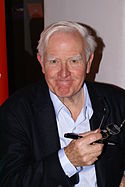John le Carre Quote
It is not fashionable to quote Stalin but he said once, half a million liquidated is a statistic, but one man killed in a traffic accident is a national tragedy. He was laughing, you see, at the bourgeois sensitivities of the mass. He was a cynic. But what he meant is still true: a movement which protects itself against counter-revolution can hardly stop at the exploitation - or the elimination, Leamas - of a few individuals. It is all one, we have never pretended to be wholly just in the process of rationalising society. Some Roman said it, didn't he, in the Christian Bible - it is expedient that one man should die for the benefit of many.
John le Carre
It is not fashionable to quote Stalin but he said once, half a million liquidated is a statistic, but one man killed in a traffic accident is a national tragedy. He was laughing, you see, at the bourgeois sensitivities of the mass. He was a cynic. But what he meant is still true: a movement which protects itself against counter-revolution can hardly stop at the exploitation - or the elimination, Leamas - of a few individuals. It is all one, we have never pretended to be wholly just in the process of rationalising society. Some Roman said it, didn't he, in the Christian Bible - it is expedient that one man should die for the benefit of many.
Related Quotes
About John le Carre
David John Moore Cornwell (19 October 1931 – 12 December 2020), better known by his pen name John le Carré ( lə-KARR-ay), was a British author, best known for his espionage novels, many of which were successfully adapted for film or television. A "sophisticated, morally ambiguous writer", he is considered one of the greatest novelists of the postwar era. During the 1950s and 1960s, he worked for both the Security Service (MI5) and the Secret Intelligence Service (MI6). Near the end of his life, due to his strong disapproval of Brexit, he took out Irish citizenship, which was possible due to his having an Irish grandparent.
Le Carré's third novel, The Spy Who Came in from the Cold (1963), became an international best-seller, was adapted as an award-winning film, and remains one of his best-known works. This success allowed him to leave MI6 to become a full-time author. His novels which have been adapted for film or television include The Looking Glass War (1965), Tinker Tailor Soldier Spy (1974, 2011), Smiley's People (1979), The Little Drummer Girl (1983), The Night Manager (1993), The Tailor of Panama (1996), The Constant Gardener (2001), A Most Wanted Man (2008) and Our Kind of Traitor (2010). Philip Roth said that A Perfect Spy (1986) was "the best English novel since the war".
Le Carré's third novel, The Spy Who Came in from the Cold (1963), became an international best-seller, was adapted as an award-winning film, and remains one of his best-known works. This success allowed him to leave MI6 to become a full-time author. His novels which have been adapted for film or television include The Looking Glass War (1965), Tinker Tailor Soldier Spy (1974, 2011), Smiley's People (1979), The Little Drummer Girl (1983), The Night Manager (1993), The Tailor of Panama (1996), The Constant Gardener (2001), A Most Wanted Man (2008) and Our Kind of Traitor (2010). Philip Roth said that A Perfect Spy (1986) was "the best English novel since the war".
